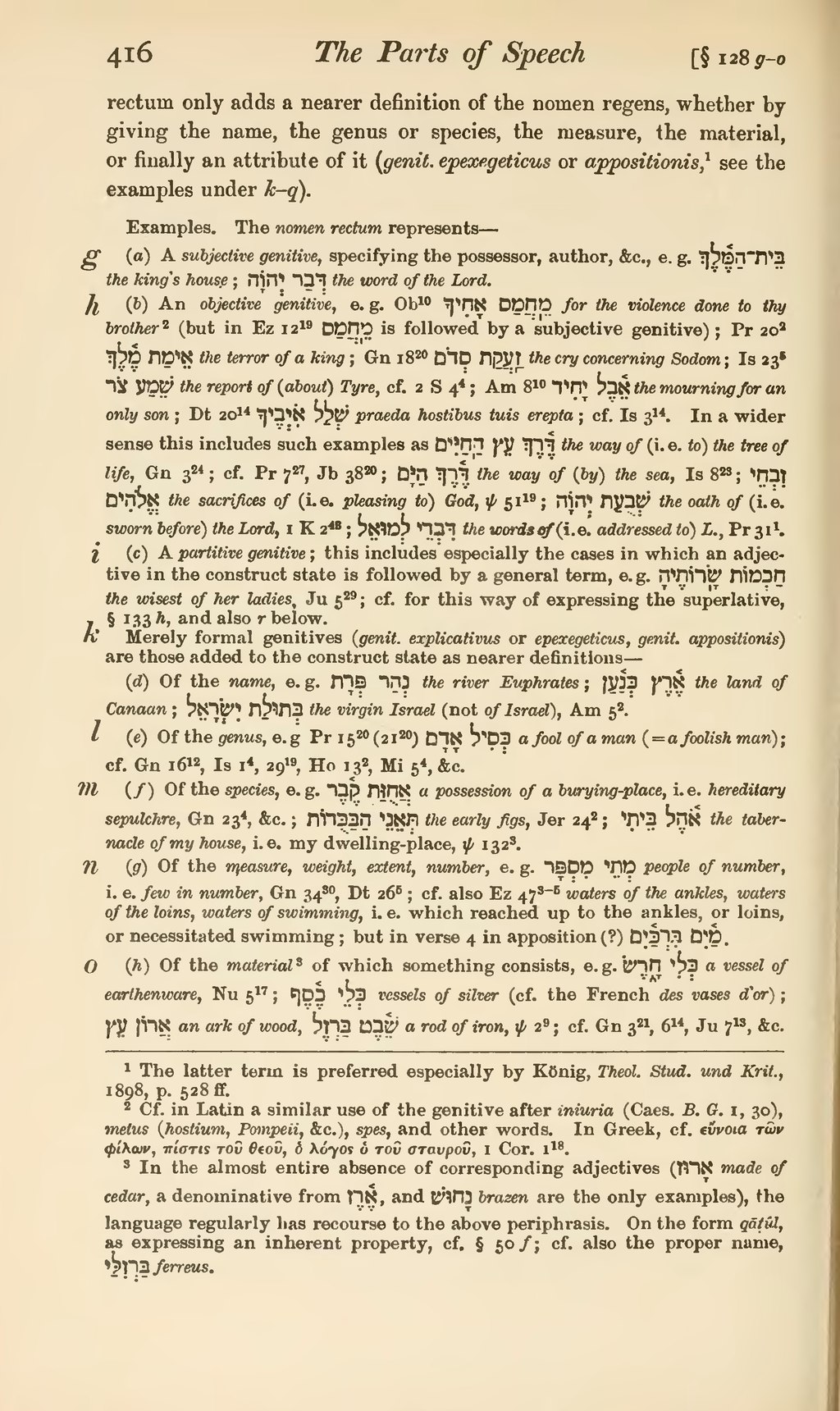rectum only adds a nearer definition of the nomen regens, whether by giving the name, the genus or species, the measure, the material, or finally an attribute of it (genit. epexegeticus or appositionis,[1] see the examples under k–q).
Examples. The nomen rectum represents—
[g] (a) A subjective genitive, specifying the possessor, author, &c., e.g. בֵּית־הַמֶּ֫לֶךְ the king’s house; דְּבַר יְהֹוָה the word of the Lord.
[h] (b) An objective genitive, e.g. Ob 101 מֵֽחֲמַס אָחִיךָ for the violence done to thy brother[2] (but in Ez 12 מֵֽחֲמַס is followed by a subjective genitive); Pr 20 אֵימַת מֶ֫לֶךְ the terror of a king; Gn 18 זַֽעֲקַת סְדֹם the cry concerning Sodom; Is 23 שֵׁמַע צֹר the report of (about) Tyre, cf. 2 S 4; Am 8 אֵ֫בֶל יָחִיד the mourning for an only son; Dt 20 שְׁלַל אֹֽיְבֶיךָ praeda hostibus tuis erepta; cf. Is 3. In a wider sense this includes such examples as דֶּ֫רֶךְ עֵץ הַֽחַיִּים the way of (i.e. to) the tree of life, Gn 3; cf. Pr 7, Jb 38; דֶּ֫רֶךְ הַיָּם the way of (by) the sea, Is 8; זִבְחֵי אֱלֹהִים the sacrifices of (i.e. pleasing to) God, ψ 51; שְׁבֻעַת יְהֹוָה the oath of (i.e. sworn before) the Lord, 1 K 2; דִּבְרֵי לְמוּאֵל the words of (i.e. addressed to) L., Pr 31.
[i] (c)A partitive genitive; this includes especially the cases in which an adjective in the construct state is followed by a general term, e.g. חַכְמוֹת שָֽׂרוֹתֶיהָ the wisest of her ladies, Ju 5; cf. for this way of expressing the superlative, § 133 h, and also r below.
[k] Merely formal genitives (genit. explicativus or epexegeticus, genit. appositionis) are those added to the construct state as nearer definitions—
(d) Of the name, e.g. נְהַר פְּרָת the river Euphrates; אֶ֫רֶץ כְּנַ֫עַן the land of Canaan; בְּתוּלַת יִשְׂרָאֵל the virgin Israel (not of Israel), Am 5.
[l] (e) Of the genus, e.g. Pr 15 (21:20) כְּסִיל אָדָם a fool of a man (=a foolish man); cf. Gn 16, Is 1, 29, Ho 13, Mi 5, &c.
[m] (f) Of the species, e.g. אֲחֻזַּת קֶ֫בֶר a possession of a burying-place, i.e. hereditary sepulchre, Gn 23, &c.; תְּאֵנֵי הַבַּכֻּרוֹת the early figs, Jer 24; אֹ֫הֶל בֵּיתִי the tabernacle of my house, i.e. my dwelling-place, ψ 132.
[n] (g) Of the measure, weight, extent, number, e.g. מְתֵי מִסְפָּר people of number, i.e. few in number, Gn 34, Dt 26; cf. also Ez 47–5 waters of the ankles, waters of the loins, waters of swimming, i.e. which reached up to the ankles, or loins, or necessitated swimming; but in verse 4 in apposition (?) מַ֫יִם בִּרְכַּ֫יִם.
[o] (h) Of the material[3] of which something consists, e.g. כְּלִי חָ֑רֶשׂ a vessel of earthenware, Nu 5; כְּלֵי כֶ֫סֶף vessels of silver (cf. the French des vases d’or); אֲרוֹן עֵץ an ark of wood, שֵׁ֫בֶט בַּרְזֶל a rod of iron, ψ 2; cf. Gn 3, 6, Ju 7, &c.
- ↑ The latter term is preferred especially by König, Theol. Stud. und Krit., 1898, p. 528 ff.
- ↑ Cf. in Latin a similar use of the genitive after iniuria (Caes. B. G. 1, 30), metus (hostium, Pompeii, &c.), spes, and other words. In Greek, cf. εὔνοια τῶν φίλων, πίστις τοῦ θεοῦ, ὁ λόγος ὁ τοῦ σταυροῦ, 1 Cor. 1:18.
- ↑ In the almost entire absence of corresponding adjectives (אָרוּז made of cedar, a denominative from אֶ֫רֶז, and נָחוּשׁ brazen are the only examples), the language regularly has recourse to the above periphrasis. On the form qāṭûl, as expressing an inherent property, cf. § 50 f; cf. also the proper name, בַּרְזִלַּי ferreus.

